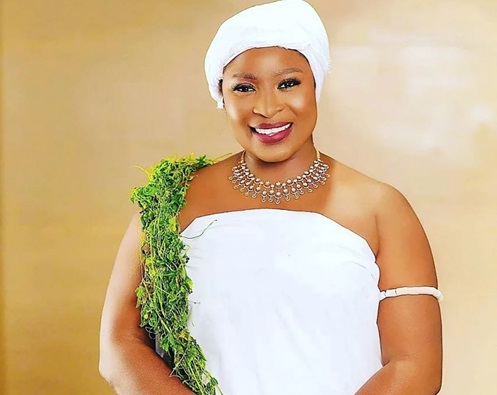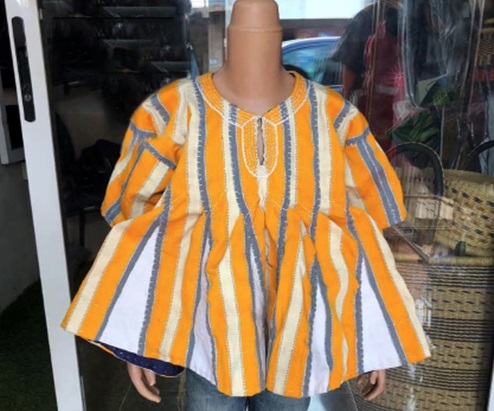
Ghana Month: Vendors cash in on cloths, accessories
Vendors who deal in made in Ghana clothes and accessories are enjoying good sales one week into the Ghana Month celebration.
Advertisement
According to these vendors, patronage of these items shot up especially in the days leading to the Independence Day anniversary on March 6.
In recent years, the Ghana Month celebration marked in March each year has become popular following the media’s commitment to promoting Ghanaian culture, history and values through the content they produce.
Vendors of local clothes and accessories such as fugu, beads, ahenema (sandals), scarves, Kente and traditional ornaments who spoke to The Mirror said many people patronised them for “Ghana Month” themed events at work or church.
While some customers bought these items, others preferred to rent them for photoshoots or short periods.

The prices of hand sewn Fugu from the Northern Region range between GH¢150 to GH¢250 for children.
Photo credit: Nock Afriq Vogue
A vendor at the Makola Shopping Mall, Naa Ayeley Otu, said most of the people who patronised her wares, especially women and producers at some media houses, rented the clothes and accessories.
She said initially, she only sold the items but realised many people preferred to rent instead buying so she started renting from last year.
“The original Kente and ornaments are very expensive and so only a few buy them for keeps.
These days, majority of my customers rent them and return after their events.”
In addition to the rental business, one of her shop attendants spent two weeks in Kumasi last year to understudy how the royals dress.
She explained that this had added more value to the service they rendered as the attendant helped people to use the pieces properly.
“Some of the beads are for men or women only.
Also, the position and type of Kente cloth and ornaments men use differs from women so if you don’t learn this from the royals or people who know the differences, you will mislead a customer,” she explained.
Asked if she did not fear the risk of losing such expensive cloths and accessories, she said customers who wanted to rent had to make a deposit which was refundable when they returned the items.
She said in some instances a representative from her shop followed the clients to their offices or residences or took their Ghana cards as collateral.
“Some people damage the items so if you are not careful in dealing with them, you will incur losses.
There are some items that we don’t rent.
Some of the ornaments are replicas so they are cheap and can easily be replaced but the originals are pricey and so we reserve them for buyers alone.”
Ghana Day events in schools
Another reason for the increase in sales was activities by schools to mark the Independence Day anniversary.
Ahead of March 6, most schools hold activities where school children dress in traditional outfits.
A fugu vendor along the Gbawe- Mallam Road, Roberta Acquah told this reporter that she had to insist that her suppliers from the Northern Region increased the number for children.
She said because fugu was an easy wear, some parents preferred that.
She added, “these are original fugu from the north and are made to last a longer time.
They are more expensive than the common ones on the market but those who patronise us always get value for their money.”
Prices for children ranged between GH¢150 and GH¢250 while the fugu for adults sold between GHc450 and GH¢600.
She also stocked traditional boots, wands and hats for people who wanted the full northern traditional regalia.
During the interview, more than four parents with children in different schools were at her shop to buy for their children.
While some schools allowed parents to decide on the outfits, others had assigned specific regions to a group of students and parents had to get matching outfits for these regions.
A parent, Mrs Cynthia Anawey, said although some of the clothes and accessories were expensive, she was happy her children get to learn about Ghanaian traditions and culture.
“These days you hardly hear children even speak local languages and so activities like these help them to know Ghana has a rich and beautiful culture.”
Every day should be “Ghana Day”.
In an interview, a tourism curator and culture advocate, PaJohn Bentsifi Dadson, said instead of waiting for the annual celebration, Ghana must be celebrated every day.
“Every day, indeed, should be "Ghana Day"! Remember the 'Friday Wear' campaign.
Most looked to Friday's arrival so they could feel freer in the more relaxed locally made outfit for work as opposed to the restrictive suit! Gradually, it gained a decent level of appreciation and, I believe, this helped pick up our local cottage dressmaking industry.
Especially, the tie and dye businesses.
“What new taxes came to derail that trajectory is another discussion.
But if we had, as other jurisdictions do intentionally, kept the focus and translated the attention to wearing locally made to eating and vacationing locally, imagine what we would have made of ourselves by now!
“But we are never intentional about these things that can build both our rural and urban economies.
Taxes come between and help us abandon the consumption of what is intrinsically ours.
The Government needs to be intentional about the things it taxes, so as to keep those manufactured locally afloat to keep the cheaper foreign alternatives at bay.
Let's focus and "do Ghana" every day! It's the only way we can grow the Ghana we want,” he advised.




